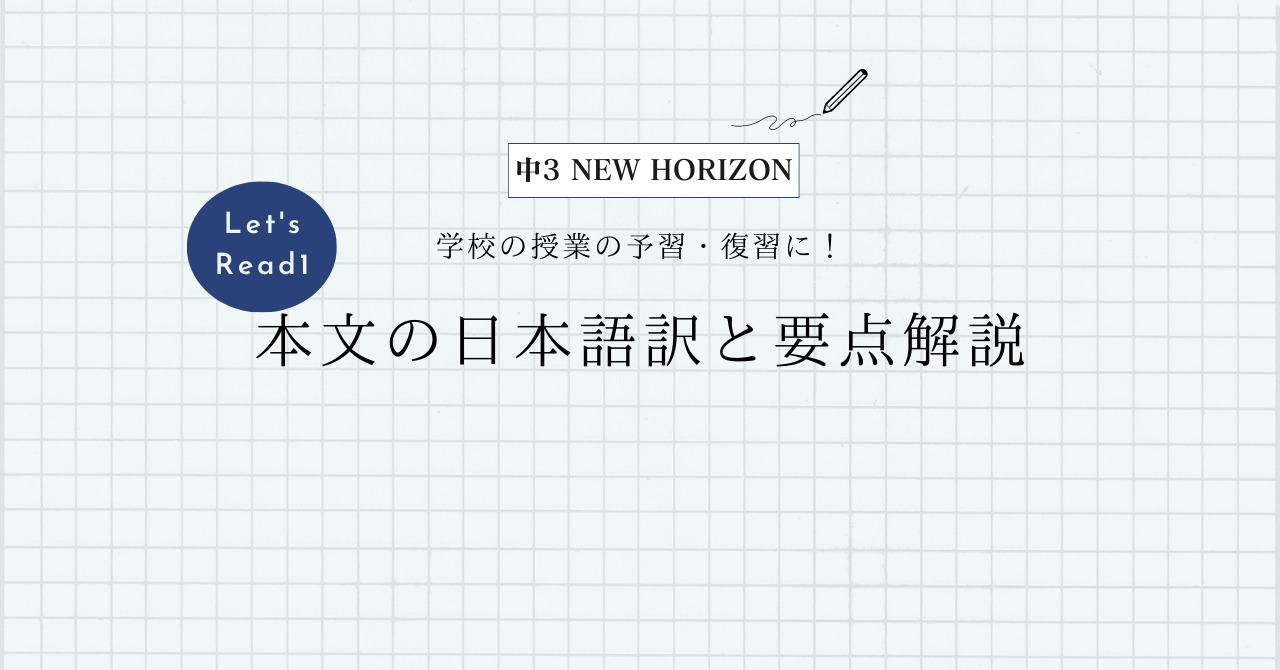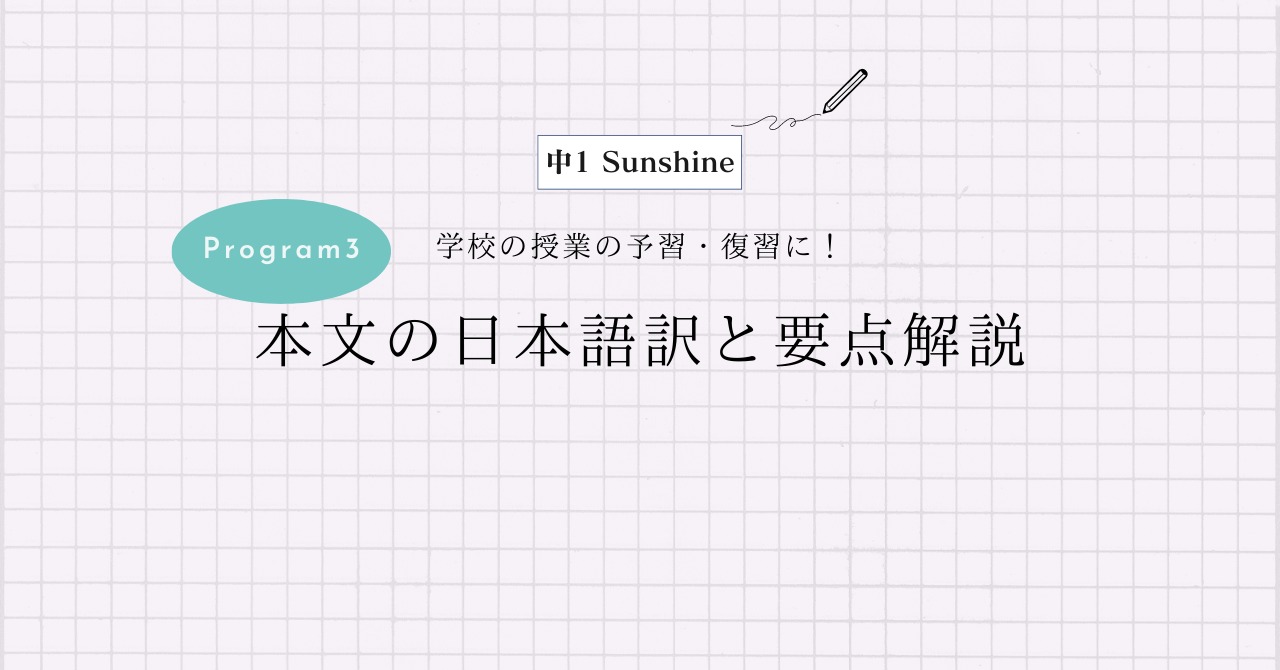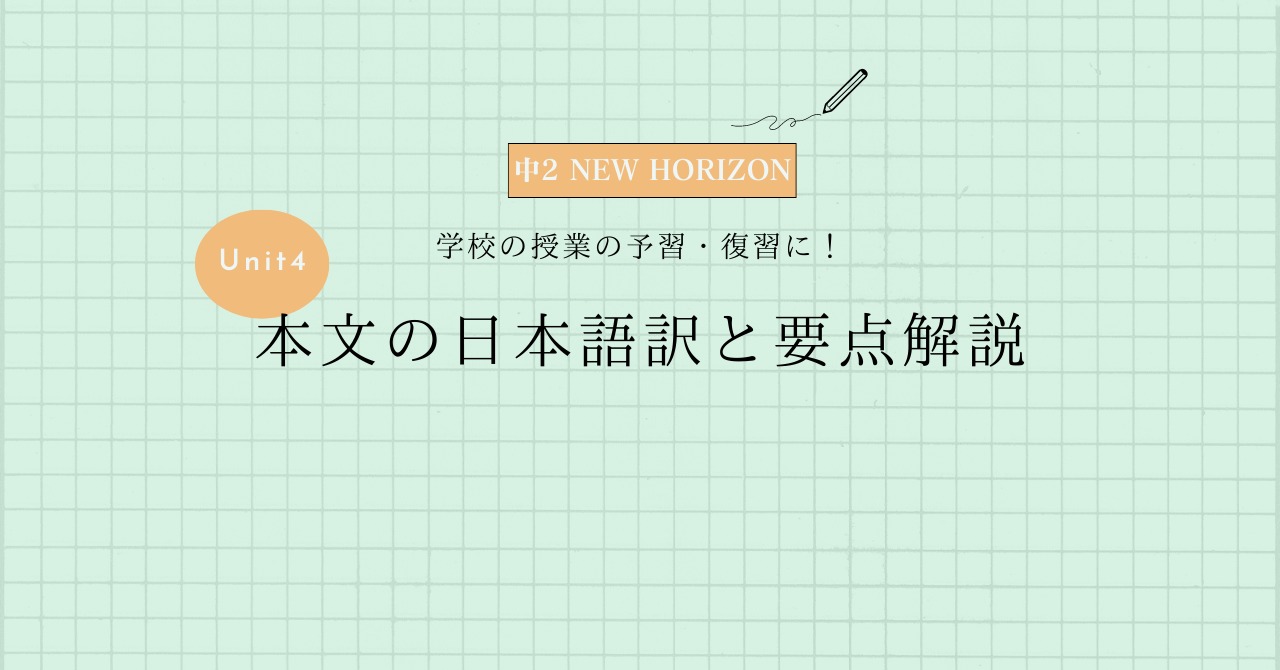東京書籍 中学3年生 NEW HORIZON(ニューホライズン) Let’s Read1の本文の日本語訳と重要箇所の解説です。
Unit3の解説はこちらからご覧ください。
>中3NEW HORIZON Unit3 Scene1 本文和訳
>中3NEW HORIZON Unit3 Scene2 本文和訳
>中3NEW HORIZON Unit3 Read & Think1 本文和訳
>中3NEW HORIZON Unit3 Read & Think2 本文和訳
- Let’s Read1 本文と日本語訳
- Let’s Read1 重要事項の解説
- A big, old tree stands by a road near the city of Hiroshima.
- Through the years, it has seen many things.
- A mother was singing to her little girl under the tree.
- They looked happy, and the song sounded sweet.
- But the tree remembered something sad.
- “Yes. It was some eighty years ago. I heard a lullaby that night, too.”
- Many people lost their lives, and many others were injured.
- They had burns all over their bodies.
- I was very sad when I saw those people.
- Some of the people fell down near me.
- I said to them, “Come and rest in my shade. You’ll be all right soon.”
- Night came. Some people were already dead.
- Then she began to sing again.
- She was very weak, but she tried to be a mother to the poor little boy.
- She held him in her arms like a real mother.
- “Mommy,” the boy was still crying.
- “Be a good boy,” said the girl. “You’ll be all right.”
- She held the boy more tightly and began to sing again.
- Aher a while, the boy stopped crying and quietly died.
- The girl’s voice became weaker and weaker.
- Morning came and the sun rose, but the girl never moved again.
- On May 27, 2016, a man visited Hiroshima and gave a speech at the city’s Peace Memorial Park.
- He began, “Seventy-one years ago, on a bright, cloudless morning, death fell from the sky and the world was changed.”
- He became the first sitting U.S. president to visit Hiroshima.
- In its guest book, he left these words:
- We have known the agony of war.
- Let us now find the courage, together, to spread peace, and pursue a world without nuclear weapons.
- He also left two paper cranes there.
- They were folded by Obama himself.
- “The world was forever changed here.
- But today, the children of this city will go through their day in peace.
- What a precious thing that is!
- It is worth protecting, and then extending to every child.”
- Let’s Read1 まとめ
Let’s Read1 本文と日本語訳
A Mothers Lullaby
お母さんの子守唄
A big, old tree stands by a road near the city of Hiroshima.
「大きくて古い木が広島市に近い道路のそばに立っています。」
Through the years, it has seen many things.
「何年にもわたって,その木はたくさんのものを見てきています。」
One summer night, the tree heard a lullaby.
「ある夏の夜,木は子守唄を聞きました。」
A mother was singing to her little girl under the tree.
「お母さんが木の下で小さな女の子に歌っていました。」
They looked happy, and the song sounded sweet.
「2人は幸せそうで,その歌は心地よく聞こえました。」
But the tree remembered something sad.
「しかしその木は悲しいことを思い出しました。」
“Yes. It was some eighty years ago. I heard a lullaby that night, too.”
『それは80年くらい前のことでした。私はあの夜も子守唄を聞きました。』
On the morning of that day, a big bomb fell on the city of Hiroshima.
「その日の朝,大きな爆弾が広島市に落ちました。」
Many people lost their lives, and many others were injured.
「たくさんの人が命を失って,その他大勢の人が傷つきました。」
They had burns all over their bodies.
「彼らは体中に火傷を負いました。」
I was very sad when I saw those people.
「そんな人々を見て私はとても悲しくなりました。」
It was a very hot day.
「とても暑い日でした。」
Some of the people fell down near me.
「私の近くで倒れる人もいました。」
I said to them, “Come and rest in my shade. You’ll be all right soon.”
「私は彼らに『陰に来て休みなさい。すぐに元気になりますよ。』と言いました。」
Night came. Some people were already dead.
「夜が来ました。もう死んでしまっている人もいました。」
I heard a weak voice. It was a lullaby.
「私は弱い声を聞きました。それは子守唄でした。」
A young girl was singing to a little boy.
「若い女の子が小さな男の子に歌っていました。」
“Mommy! Mommy!” the boy cried.
「『お母ちゃん!お母ちゃん!』男の子は泣いていました。」
“Don’t cry,” the girl said. “Mommy is here.”
「『泣かないで,お母ちゃんはここにいるよ。』と女の子は言いました。」
Then she began to sing again.
「それから彼女はまた歌い始めました。」
She was very weak, but she tried to be a mother to the poor little boy.
「彼女はとても弱っていましたが,かわいそうな小さな男の子にとってのお母さんになろうとしました。」
She held him in her arms like a real mother.
「彼女は本当のお母さんのように腕の中で男の子を抱きました。」
“Mommy,” the boy was still crying.
「『お母ちゃん』男の子はまだ泣いていました。」
“Be a good boy,” said the girl. “You’ll be all right.”
「『良い子にして,大丈夫だよ。』と女の子は言いました。」
She held the boy more tightly and began to sing again.
「彼女は男の子をもっとしっかり抱いて,また歌い始めました。」
Aher a while, the boy stopped crying and quietly died.
「しばらくして,男の子は泣き止んで,静かに亡くなりました。」
But the little mother did not stop singing. It was a sad lullaby.
「でも小さなお母さんは歌うのをやめませんでした。それは悲しい子守唄でした。」
The girl’s voice became weaker and weaker.
「女の子の声はどんどん弱くなっていきました。」
Morning came and the sun rose, but the girl never moved again.
「朝が来て太陽が昇りましたが,女の子が再び動くことはありませんでした。」
A World without Nuclear Weapons
核兵器のない世界
On May 27, 2016, a man visited Hiroshima and gave a speech at the city’s Peace Memorial Park.
「2016年5月27日,1人の男が広島を訪れて,市の平和記念公園でスピーチを行いました。」
He began, “Seventy-one years ago, on a bright, cloudless morning, death fell from the sky and the world was changed.”
「彼は『71年前,眩しくて雲1つない朝に,空から死が降ってきて世界は変わりました。』と始めました。」
The man’s name is Barack Obama.
「その男の名前はバラク・オバマです。」
He became the first sitting U.S. president to visit Hiroshima.
「彼は広島を訪れた最初の現職のアメリカ大統領になりました。」
It meant a lot to the city, to Japan, and to the world.
「そのことは市にとって,日本にとって,そして世界にとって多くのことを意味していました。」
Before the speech, Obama visited the museum there.
「スピーチの前に,オバマはそこの博物館を訪れました。」
In its guest book, he left these words:
「来賓名簿の中に,彼はこの言葉を残しました。」
We have known the agony of war.
「私たちは戦争の苦しみを知っています。」
Let us now find the courage, together, to spread peace, and pursue a world without nuclear weapons.
「今,平和を広めるために一緒に勇気を出して,核兵器のない世界を追求しましょう。」
He also left two paper cranes there.
「彼はそこに2羽の紙の鶴も置いていきました。」
They were folded by Obama himself.
「それはオバマ自身に折られたものでした。」
Obama closed his speech by saying,
「オバマはスピーチをこう言って終えました。」
“The world was forever changed here.
『世界はこの場所で永遠に変わりました。』
But today, the children of this city will go through their day in peace.
『しかし今日,この町の子どもたちは平和の中で1日を過ごすでしょう。』
What a precious thing that is!
『それはなんと大切なことなのでしょう!』
It is worth protecting, and then extending to every child.”
『それは守る価値があることであり,それからすべての子どもに広めていくべきものです。』

Let’s Read1 重要事項の解説
A big, old tree stands by a road near the city of Hiroshima.
“stand”は「立つ,立っている」という動詞です。
“by”は「~のそばに」,“near”は「~の近くに」という前置詞になります。
Through the years, it has seen many things.
“through”は「~を通して」という前置詞ですが,“through the years”で「何年にもわたって」という表現になります。
また,“has seen”は「現在完了の継続用法」になっていますね。
A mother was singing to her little girl under the tree.
この文では「過去進行形」が使われていますね。
“sing to(for) 人”で「人に歌う」となりますよ。
“little”は「小さな」という形容詞で,“under”は「~の下で」という前置詞です。
They looked happy, and the song sounded sweet.
“look 形容詞”で「~そうに見える」という重要表現です。
“sound 形容詞”は「~に聞こえる」となり,“sweet”は「甘い,心地よい」といった意味があります。
But the tree remembered something sad.
“remember”は「を思い出す,を覚えている」という動詞です。
“something”は「何か」という代名詞で,“sad”は「悲しい」という形容詞です。
“something”や”anything”といった”-thing”という形の名詞を修飾するときは,必ず後ろから修飾します!
“sad something”としてはダメですよ!
“Yes. It was some eighty years ago. I heard a lullaby that night, too.”
“some”は「約,およそ」という副詞として使われています。
“lullaby”は「子守唄」という名詞ですね。
“too”は文末にカンマとセットで付けて「~も」となります。
Many people lost their lives, and many others were injured.
“lost”は“lose”の過去形で,「~を失う,なくす」です。
“lives”は“life”(生活,人生)の複数形で,語尾が”f,fe”で終わる名詞を複数形にするときは”f,fe”を取って”ves”をつけます。
knife→knives(ナイフ), leaf→leaves(葉)などがあります。
“other”は「他者」という名詞で使われていて,“injure”は「を傷つける」という動詞です。
“were injured”なので「受動態」になっていますね。
They had burns all over their bodies.
“burn”は「火傷」という名詞です。
“all over”は副詞で「全体にわたって,~中」といった意味になります。
I was very sad when I saw those people.
この文では「接続詞when」が使われていますね。
“those”は“that”の複数形で,「あれらは,あれらの」という意味ですが,今回は「そんな人々」としました。
Some of the people fell down near me.
“fell”は“fall(落ちる)”の過去形で,“fall down”で「落ちる,転ぶ,倒れる」といった意味になります。
また,”some”から始まる文は,「~という人もいる」くらいで訳してあげると綺麗な日本語になりやすいですよ。
I said to them, “Come and rest in my shade. You’ll be all right soon.”
“rest”は「休憩する」という動詞です。「休憩」という名詞の意味もありますよ。
“shade”は「影」ですね。
“all right”は「大丈夫で」といった意味合いで,“soon”は「すぐに」という副詞です。
Night came. Some people were already dead.
“already”は「すでに,もう」という副詞です。
“dead”は「死んでいる」という形容詞になります。
Then she began to sing again.
“then”は「それから,そのとき,それでは」といった意味の副詞です。文に応じて柔軟に訳してあげてください。
“began”は“begin(を始める)”の過去形で,“to sing”は「不定詞の名詞的用法」になっていますね。
“again”は「再び」という副詞です。
She was very weak, but she tried to be a mother to the poor little boy.
“weak”は「弱い」という形容詞です。対義語は“strong”ですね。
“try to 動詞の原形”は「~しようとする」という意味で,挑戦してみたけどダメだったというようなニュアンスで使われることが多いです。難しいといった意味合いが含まれるということですね。
一方で“try 動名詞”は,「(試しに)~してみる」という表現になります。つまりその行為自体はできたという意味合いになります。
“to the poor~”の“to”は前置詞で「~にとっての」という意味で,“poor”は「貧しい,かわいそうな」という形容詞です。
She held him in her arms like a real mother.
“held”は“hold”の過去形で,「を抱きしめる」となります。“arm”は「腕」ですね。
“like”は「~のように」という前置詞で,“real”は「本当の」という形容詞になります。
“Mommy,” the boy was still crying.
この文でも「過去進行形」が使われていますね。
“still”は「まだ,いまだに」という副詞で,“cry”は「泣く,叫ぶ」という動詞です。
“Be a good boy,” said the girl. “You’ll be all right.”
“Be~”は「命令文」になっていますね。
また,発言内容が文の先頭に来た時は,語順が「動詞 主語」と反対になることがあります。
今回の文も正しく書き換えるとThe girl said “Be a good boy.”となります。
She held the boy more tightly and began to sing again.
“tightly”は「しっかりと,きつく」という副詞で,“more”が付いているので「比較級」になっています。
“to sing”は「不定詞の名詞的用法」になっていますね。
Aher a while, the boy stopped crying and quietly died.
“after a while”は「しばらくして」という重要表現です。
“stop 動名詞”で「~するのをやめる」となります。
「動名詞」の部分を「不定詞」に変えると「~するために立ち止まる」という意味になるので,書き換えることはできません。この点もしっかりと覚えておきましょう!
“quietly”は「静かに」という副詞で,“died”は“die(死ぬ)”の過去形ですね。
The girl’s voice became weaker and weaker.
“became”は“become(~になる)”の過去形です。
“比較級 and 比較級”で「ますます~だ」という重要表現になります。
Morning came and the sun rose, but the girl never moved again.
“sun”は「太陽」で,“rose”は“rise(昇る)”の過去形です。
“never”は「決して~ない」という強い否定を表す副詞で,“move”は「動く」という動詞ですね。
On May 27, 2016, a man visited Hiroshima and gave a speech at the city’s Peace Memorial Park.
“give a speech”で「スピーチ(演説)をする」という表現になります。
He began, “Seventy-one years ago, on a bright, cloudless morning, death fell from the sky and the world was changed.”
“bright”は「眩しい,明るい」,“cloudless”は「雲一つない」という形容詞です。
“death”は「死」という名詞ですね。
“was changed”は「受動態」になっています。
He became the first sitting U.S. president to visit Hiroshima.
“sitting”は「現職の,在職の」という形容詞で,“president”は「大統領」ですね。
“to visit”は「不定詞の形容詞的用法」になっていて,直前の“president”を修飾しています。
訳は「~のための」だと変になるので,「広島を訪れた大統領」でOKです。
In its guest book, he left these words:
“its”は「その」という目的格の代名詞ですね。
“left”は“leave”の過去形で「出発する,去る」といった,「ある場所から離れる」というイメージを持つ動詞ですが,「を置き忘れる,残す,ままにする」といった意味もありますよ!
“these”は“this”の複数形で「これらは,これらの」という意味です。
最後の「:」は「コロン」と言い,簡単に言うと「つまり」という具合に直前の文章を補足します。コロンを使うときは,コロンの前は必ず文にしないといけない点に注意してください。
We have known the agony of war.
この文では「現在完了の継続用法」が使われています。
“agony”は「激しい苦痛,苦しみ」という名詞になります。
“of”は前置詞で,”A of B”の形で「BのA」というように後ろから前に訳します。
Let us now find the courage, together, to spread peace, and pursue a world without nuclear weapons.
“let 人(もの) 動詞の原形”で「人(もの)に~させてあげる,人(もの)が~するのを許す」となります。
ただ,“let us”の短縮形は”let’s”なので,この文は「~しましょう」と訳してOKです。略さず言うと少し堅苦しい表現になります。
“find”は「を見つける」,“courage”は「勇気」で,今回は「勇気を出す」と訳しました。
“spread”は「を広める」という動詞で,“to spread”は「不定詞の副詞的用法」になっています。
“pursue”は「を追いかける,追求する」という動詞で,“and”によって”find”とセットで”let us”にかかっています。そのため「追求しましょう」となります。
“without”は「~なしで」という重要な前置詞で,“nuclear”は「核の」という形容詞,“weapon”は「武器,兵器」という名詞になります。
He also left two paper cranes there.
“also”は「また,さらに」といった副詞で,付け加える役割があります。色々な文で使うので必ず覚えましょう!
“crane”は「鶴」という名詞ですね。
They were folded by Obama himself.
“fold”は「を折る」という動詞で,“were folded”は「受動態」になっています。
“himself”などの“~self”という単語は再帰代名詞と言い,単語の直後に置くことで強調する役割があります。今回は“He”が強調されて「彼自身」ということです。
“The world was forever changed here.
“forever”は「永遠に,永久に」という副詞です。
また,この文も「受動態」が使われていますね。
But today, the children of this city will go through their day in peace.
“go through~”は「を通過する,経験する」という意味になります。
“in peace”は「平和に,安心して」という意味です。“peace”が「平和」という名詞ですね。
What a precious thing that is!
この文は「感嘆文」になっていますね。
“precious”は「貴重な,大切な」という形容詞です。
It is worth protecting, and then extending to every child.”
“worth”は「~の価値がある」という形容詞で,後ろに「動名詞」を置くことが多いです。
“protect”は「を守る」,“extend”は「を伸ばす,延長する,広げる」という動詞になります。
“every”は「すべての」という形容詞で,後ろに置く名詞は必ず単数形にします。
Let’s Read1 まとめ
以上がLet’s Read1の日本語訳となります。
ここでは今までに習った文法がたくさん使われていますね。どれも大切な文法なのでしっかり理解していきましょう!
>中3NEW HORIZON Unit3 Scene1 本文和訳
>中3NEW HORIZON Unit3 Scene2 本文和訳
>中3NEW HORIZON Unit3 Read & Think1 本文和訳
>中3NEW HORIZON Unit3 Read & Think2 本文和訳
何か分からない点や他に解説してほしい点があれば,お気軽にコメントしてください!




コメント